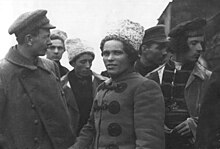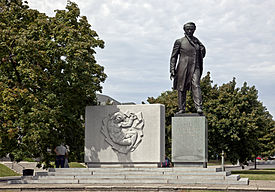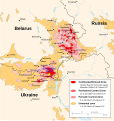Portal:Ukraine
The Ukraine Portal - Портал України
Ukraine Україна (Ukrainian) | |
|---|---|
| ISO 3166 code | UA |
Ukraine is a country in Eastern Europe. It is the second-largest European country after Russia, which borders it to the east and northeast. Ukraine also borders Belarus to the north; Poland and Slovakia to the west; Hungary, Romania and Moldova to the southwest; and the Black Sea and the Sea of Azov to the south and southeast. Kyiv is the nation's capital and largest city, followed by Kharkiv, Dnipro, and Odesa. Ukraine's official language is Ukrainian.
Humans have inhabited Ukraine since 32,000 BC. During the Middle Ages, it was the site of early Slavic expansion and later became a key centre of East Slavic culture under the state of Kievan Rus', which emerged in the 9th century. Kievan Rus' became the largest and most powerful realm in Europe in the 10th and 11th centuries, but gradually disintegrated into rival regional powers before being destroyed by the Mongols in the 13th century. The area was then contested, divided, and ruled by a variety of external powers for the next 600 years, including the Grand Duchy of Lithuania, Polish–Lithuanian Commonwealth, the Austrian Empire, the Ottoman Empire, and the Tsardom of Russia.
The Cossack Hetmanate emerged in central Ukraine in the 17th century but was partitioned between Russia and Poland before being absorbed by the Russian Empire in the late 19th century. Ukrainian nationalism developed and, following the Russian Revolution in 1917, the short-lived Ukrainian People's Republic was formed. The Bolsheviks consolidated control over much of the former empire and established the Ukrainian Soviet Socialist Republic, which became a constituent republic of the Soviet Union in 1922. In the early 1930s, millions of Ukrainians died in the Holodomor, a human-made famine. During World War II, Ukraine was occupied by Germany and endured major battles and atrocities, resulting in 7 million civilians killed, including most Ukrainian Jews.
Ukraine gained independence in 1991 as the Soviet Union dissolved and declared itself neutral. A new constitution was adopted in 1996 as the country transitioned to a free market liberal democracy amid endemic corruption and a legacy of state control. The Orange Revolution of 2004–2005 ushered electoral and constitutional reforms. Resurgent political crises prompted a series of mass demonstrations in 2014 known as the Euromaidan, leading to a revolution, at the end of which Russia unilaterally occupied and annexed Ukraine's Crimean Peninsula, and pro-Russian unrest culminated in a war in Donbas with Russian-backed separatists and Russia. Russia launched a full-scale invasion of Ukraine in 2022. (Full article...)
In the news
- 24 January 2025 – Russian invasion of Ukraine
- Attacks in Russia during the Russian invasion of Ukraine
- A Ukrainian drone strike targets an oil refinery in Ryazan Oblast, Russia, in one of the largest Ukrainian drone attacks inside Russia of the conflict to date. The Russian military says it shot down at least 121 drones over 13 regions overnight. (BBC News)
- Kyiv strikes
- A Russian drone strikes a ten-storey apartment building in Fastiv, Kyiv Oblast, killing at least three people. (Euronews)
- The Ukrainian Coordination Headquarters for the Treatment of Prisoners of War announces that, with assistance from the International Committee of the Red Cross, the bodies of 757 Ukrainian soldiers have been returned to Ukraine. (The Kyiv Independent)
- 20 January 2025 – Russian invasion of Ukraine
- Attacks in Russia during the Russian invasion of Ukraine
- Ukrainian drones attack industrial facilities in Tatarstan, Russia, prompting the Russian Federal Air Transport Agency to temporarily suspend flights at Kazan International Airport in Kazan and Begishevo Airport in Nizhnekamsk. (ABC News)
- 18 January 2025 – Russian invasion of Ukraine
- Kryvyi Rih strikes
- Four people are killed and 14 others are injured in a Russian ballistic missile strike on Kryvyi Rih, Ukraine, according to the Governor of Dnipropetrovsk Oblast Serhiy Lysak. (Euronews)
- Russian strikes against Ukrainian infrastructure
Featured pictures
Did you know (auto-generated)

- ... that the Dvorichna settlement hromada has remained divided between Russia and Ukraine since the 2022 Kharkiv counteroffensive?
- ... that the diary of Erich Lassota von Steblau is an important primary source on the 16th-century Zaporozhian Cossacks of Ukraine?
- ... that Sofia Halechko's first language was Polish, but she fought in World War One to create a country for Ukrainian-speaking people?
- ... that Sarah Ashton-Cirillo, covering the Russian invasion of Ukraine, said that Ukrainians care less about her being transgender than Americans do?
- ... that Serhiy Kot was the editor of Ukrainian Question, a collection of articles on the status of Ukraine in the 1930s?
- ... that 1920s belles-lettres books published by the State Publishing House of Ukraine sold out more rapidly than similar books published elsewhere in the Soviet Union, despite the higher average price?
More did you know -
- ... that the married Western Ukrainian Clergy became a hereditary caste that dominated western Ukrainian society?
- ... that according to legend, a tunnel leads from the Kamianets-Podilskyi Castle to the Khotyn Fortress which is 20 kilometres (12 mi) away?
- ... that Ukrainian naturalist, lecturer, artist and author John Lhotsky was credited as the first discoverer of gold in New South Wales?
- ... that although the secular music of Mykola Leontovych was well known in the twentieth century, the Liturgy of St. John Chrysostom was little known because of a ban on sacred music in the Soviet Union?
- ... that the Privat Group is one of the few Ukrainian companies that own industries in the United States?
- ... that among many historic landmarks at the Andrew's Descent in Kyiv, there is a medieval Gothic style castle that locals call the "Castle of Richard the Lion Heart" due to the legend the 12th century King of England had visited the building?
Selected article -

Kryvyi Rih (/ˈkrɪviː ˈriː/; Ukrainian: Кривий Ріг, IPA: [krɪwɪj ˈr⁽ʲ⁾iɦ] ⓘ), also known as Krivoy Rog (Russian: Кривой Рог [krʲɪˈvoj ˈrok]), is a city in central Ukraine. It hosts the administration of Kryvyi Rih Raion and its subordinate Kryvyi Rih urban hromada in Dnipropetrovsk Oblast. The city is part of the Kryvyi Rih Metropolitan Region. Its population is estimated at 603,904 (2022 estimate),[1] making it the seventh-most populous city in Ukraine and the second largest by area. Kryvyi Rih is claimed to be the longest city in Europe.
Located at the confluence of the Saksahan and Inhulets rivers, Kryvyi Rih was founded as a military staging post in 1775. Urban-industrial growth followed Belgian, French and British investment in the exploitation of the area's rich iron-ore deposits, generally called Kryvbas, in the 1880s. Kryvyi Rih gained city status after the October Revolution in 1919. (Full article...)
In the news
- 24 January 2025 – Russian invasion of Ukraine
- Attacks in Russia during the Russian invasion of Ukraine
- A Ukrainian drone strike targets an oil refinery in Ryazan Oblast, Russia, in one of the largest Ukrainian drone attacks inside Russia of the conflict to date. The Russian military says it shot down at least 121 drones over 13 regions overnight. (BBC News)
- Kyiv strikes
- A Russian drone strikes a ten-storey apartment building in Fastiv, Kyiv Oblast, killing at least three people. (Euronews)
- The Ukrainian Coordination Headquarters for the Treatment of Prisoners of War announces that, with assistance from the International Committee of the Red Cross, the bodies of 757 Ukrainian soldiers have been returned to Ukraine. (The Kyiv Independent)
- 20 January 2025 – Russian invasion of Ukraine
- Attacks in Russia during the Russian invasion of Ukraine
- Ukrainian drones attack industrial facilities in Tatarstan, Russia, prompting the Russian Federal Air Transport Agency to temporarily suspend flights at Kazan International Airport in Kazan and Begishevo Airport in Nizhnekamsk. (ABC News)
- 18 January 2025 – Russian invasion of Ukraine
- Kryvyi Rih strikes
- Four people are killed and 14 others are injured in a Russian ballistic missile strike on Kryvyi Rih, Ukraine, according to the Governor of Dnipropetrovsk Oblast Serhiy Lysak. (Euronews)
- Russian strikes against Ukrainian infrastructure
Selected anniversaries for January

- January 3, 1681 — Treaty of Bakhchisarai was signed by Russia, the Ottoman Empire, and the Crimean Khanate at the conclusion of the Russo-Turkish War (1676–1681).
- January 10, 1992 — the Ukrainian karbovanets replaced the Soviet ruble at par, with the ISO 4217 code being
UAK. - January 15, 1967 — David Burliuk, an avant-garde artist, died in Long Island, New York.
- January 22, 1919 — The Act Zluky was signed, unifying the Ukrainian People's Republic and the West Ukrainian National Republic.
- January 23, 2005 — Ukrainian president Viktor Yushchenko was inaugurated into office after winning the second run-off elections in late 2004.
- January 29, 1918 — Battle of Kruty takes place between the Ukrainian People's Republic and Bolshevik forces.
Photo gallery
Related portals
Religions in Ukraine
Post Soviet states
Other countries
WikiProjects and collaborations
Associated Wikimedia
The following Wikimedia Foundation sister projects provide more on this subject:
-
Commons
Free media repository -
Wikibooks
Free textbooks and manuals -
Wikidata
Free knowledge base -
Wikinews
Free-content news -
Wikiquote
Collection of quotations -
Wikisource
Free-content library -
Wikiversity
Free learning tools -
Wikivoyage
Free travel guide -
Wiktionary
Dictionary and thesaurus
New articles
Ukrainian editions of Wikimedia projects
Notes
- ^ Чисельність наявного населення України на 1 січня 2022 [Number of Present Population of Ukraine, as of January 1, 2022] (PDF) (in Ukrainian and English). Kyiv: State Statistics Service of Ukraine. Archived (PDF) from the original on 4 July 2022.

































































